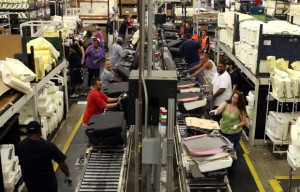Lear Corp. has been running around the clock to keep up with the red-hot sales of the Ford Explorer sports utility vehicle, and is accelerating its production.
The plant on 165th Street in Hammond is operating at full capacity and employs more than eight times as many workers as it did five years ago.
These days, the only times the first-tier auto parts supplier’s 100,000-square-foot plant isn’t filled with employees is Saturday nights and Sunday mornings.
The Hammond plant has been churning out 63 sets of car seats per hour seven days a week, and is upping its hourly production by about 14 percent. The plant has to start producing 72 sets of seats per hour to continue to feed the nearby Chicago Assembly Plant, which makes the Explorer and other hot-selling Ford vehicles, Lear Corp. plant manager Michael Segvich said.
Explorer sales are up 25.9 percent so far this year, as compared to last year, according to Ford Motor Co. Overall Ford sales are up by 13.9 percent this year, and the automaker’s June sales reached their highest level since 2006.
The impact has been dramatic on Lear’s Hammond facility, which makes seats for the Explorer, the Taurus, and the Police Interceptor versions of both those vehicles, along with the Lincoln MKS.
Flash back to 2008. Car sales were in the dumps. Detroit automakers were in bankruptcy court and lining up for government bailouts.
Dealerships across the country were closing. Showrooms were shuttered. Inventories were liquidated.
As few as 89 workers clocked in at the Lear plant during the downturn, Segvich said. But the employment has since rebounded to 764 employees, including 710 hourly workers.
“We can’t make enough seats for Ford right now,” Segvich said.
Workers crowd around the plant’s three assembly lines, tightening bolts, installing heating pads and steaming wrinkles out of the fabric. They stuff foam padding into cloth, suede or leather seat covers. They attach head restraints and reclining mechanisms.
If the seat is for a Police Interceptor, they put in special stab-proof plates.
They check the seats. They check them with lasers, by sight and by hand. They check them again and again to ensure all the bolts are torqued just right and every piece is calibrated to the automaker’s exact specifications.
The Lear employees, who are members of United Auto Workers Local 2335, need only about 50 minutes to make a fully finished seat that is ready to install in a vehicle.
Finished seats pile up fast, filling pallets on metal racks that stand a few stories high. But they don’t stay there for long.
Thriving business
Lear’s Hammond plant is a just-in-time supplier, meaning it doesn’t make the part if Ford doesn’t order it.
As of late, they have been shipping out 34 truckloads of seats a day, which mostly go to the Chicago factory. Every seat made in Hammond that’s bound for Ford’s Chicago Assembly Plant in Hegewisch ends up in a vehicle within four hours, Segvich said.
About 70 percent of the seats they make go into the Explorer, which is one of Ford’s top-selling vehicles with more than 75,000 units sold so far this year.
Workers build those seats every day from 6 a.m. to 4:30 p.m., and then from 6 p.m. to 4 a.m.
The Hammond plant is back up to three shifts after shrinking to just one during the downturn.
That has affected nearby Contract Services Group, which furnishes Lear with seating sub-assemblies. The auto parts supplier also has been running three shifts to keep up with demand.
Business has been thriving as the auto industry has rebounded, said Contract Services GroupPresident Mirko Marich.
“A lot of companies went out of business, but fortunately for us we were able to modify our business model and weather the storm,” he said. “We’ve been seeing some pretty amazing growth over the past couple of years.”
Much of the growth can be attributed to Ford’s decision to retrofit the Chicago Assembly Plant, which had only produced the Taurus for years, to make several different types of vehicles, Marich said. That way, if sales of one car model flag, another vehicle could pick up the slack.
Sales have been so strong of late that the Lear plant will only idle for one week this summer instead of the usual two weeks. Segvich can’t recall the Hammond plant ever taking such a short summer break for maintenance in the 18 years he’s worked there.
“We’ve gotten about as busy as we can get,” he said.
Article and photograph courtesy of The Times Newspaper

